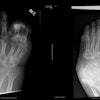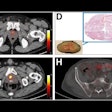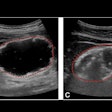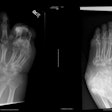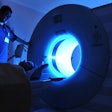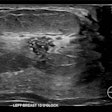When I was younger, I was a fool. I was cocksure, impatient, anti-authoritarian, and lacking social graces. Some of my colleagues may say, "No change there, then," bless them. At least I now have some insight, I suppose.
It is reassuring to see the youth of today is similarly afflicted. In some ways it is the job of the young to be pig-headed. We need over-confident and indignant, but foolish, young people -- mainly as they make the older generations look wise by comparison.
 Dr. Paul McCoubrie is a consultant radiologist at Southmead Hospital in Bristol, U.K.
Dr. Paul McCoubrie is a consultant radiologist at Southmead Hospital in Bristol, U.K.
As I enter my midcareer years, I've long wanted to be thought of as wise. Who wouldn't want to have their opinions valued and treasured? The trouble is it normally takes decades of experience. You're just getting the hang of everything -- then you retire. Or die, whichever comes first.
At first glance it seems there are no shortcuts. There is no book, lecture, or diploma course in "radiological wisdom." So, over the years, I've analyzed my radiological role models and studied the habits of my more senior colleagues. It soon became clear there are some tricks that can be employed. Specifically, you need to (1) look, (2) act, and (3) sound like you are wise.
For starters, appearances are everything. A wise radiologist needs gray hair to give them Authority, spectacles to appear Intelligent, and hemorrhoids for an Anxious Expression.
A wise radiologist always appears calm. All the toil, hard work, and clever tricks are hidden. They never hurry, always seeming measured and patient. These are definitely behaviors that can be learned. A swimming swan looks serene, but underneath, the feet are paddling furiously.
Say less than necessary
A wise radiologist always says less than necessary. A sphinx-like radiologist can impress merely with the occasional gnomic utterance, particularly if it is an ambiguous aphorism. This is an old gambit -- the King James Bible states: "Even a fool, when he holdeth his peace, is counted wise: and he that shutteth his lips is esteemed a man of understanding" (Proverbs 17:28).
The reputation of being wise can be lost as well as won. A wise radiologist doesn't want to fall off their revered pedestal. I was once told the trick is, "Never retract, never explain, and never apologize." After all, the right sort of people do not want apologies and the wrong sort of people take a mean advantage of them.
Fundamentally, there has to be some substance as well as style. You have to have been there, done that, and bought the t-shirt. The three traditional pillars of wisdom are seeing much, studying much, and suffering much.
Phronesis defined
Phronesis is the ancient Greek word for this type of wisdom; a practical wisdom learned through experience. The meaning is also tied up with being virtuous, moral, and ethical --understandably, Aristotle was rather keen on the concept.
However, the Road to Phronesis is scattered with hazards and seemingly attractive diversions. The journey toward this life goal is easily derailed. The naturally inquisitive mind is prone to prevarication and impulsive deviation from the task in hand.
This can be conceptualized as "the monkey of instant gratification," a creature that lives at the back of your brain. Most radiologists shackle this creature tightly. We have to focus and work hard otherwise our career stalls. However, this chaotic beast often escapes its shackles when bored. It wrestles the mental controls away from the straight and narrow, looking for immediate fun via all and any channels available.
The impulsive actions of this mental simian explain why you can't resist social media, glossy magazines, and other inexplicably attractive deviations, particularly when faced with an absolute deadline for something tedious (e.g., your tax return).
Some find it difficult to control "the monkey." They are extreme prevaricators that can't stick to the task in hand. Whilst often endlessly interesting people, they are usually quite chaotic. The late great author Douglas Adams was notorious for this. He once said, "I love deadlines. I love the whooshing noise they make as they go by."
This is not a modern plague. Well, it is, but, again, the Greeks had a word for it -- akrasia, describing a lack of self-control or acting against better judgement. It isn't being weak-willed as such. It is more about the established cognitive bias of wanting rewards right now, even small rewards, rather than substantive delayed gratification. For example, people overwhelmingly choose to have one euro now rather than three euros tomorrow. We are hardwired to do this. We have to fight our inner chimp not to give in to this.
So, when the steps to wisdom are laid out, it seems within grasp. Every radiologist should be able to achieve this. But knowing the steps is one thing; climbing them is another. For some, the act of looking, sounding, and acting wise is too much. We wear our hearts on our sleeves; we are scrupulously honest, freely admitting our Foolishness, shattering illusions of wisdom. For others, conscientious and sustained hard work is too much. We sacrifice the slow accumulation of wisdom for impulsive fun and short-lived bacchanalia. And why not? Life is short.
But for me, there is one deal breaker. If becoming a wise radiologist means having to develop hemorrhoids, count me out. So, you'll have to excuse me, my inner chimp is calling...
Dr. Paul McCoubrie is a consultant radiologist at Southmead Hospital in Bristol, U.K.
The comments and observations expressed herein do not necessarily reflect the opinions of AuntMinnieEurope.com, nor should they be construed as an endorsement or admonishment of any particular vendor, analyst, industry consultant, or consulting group.


